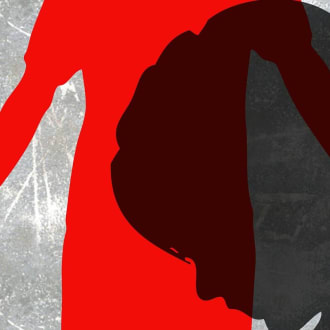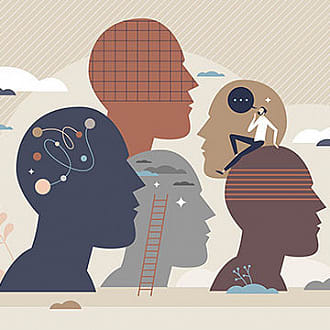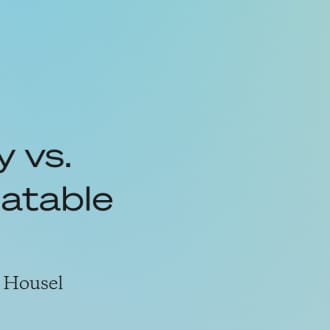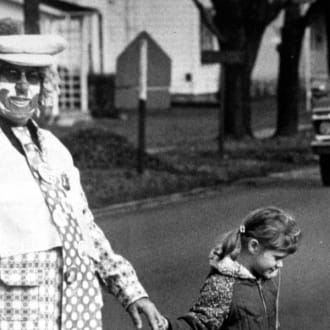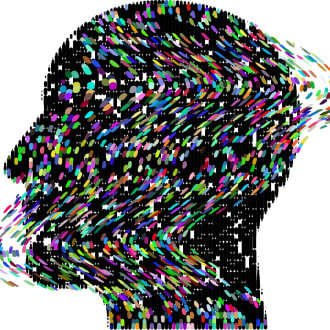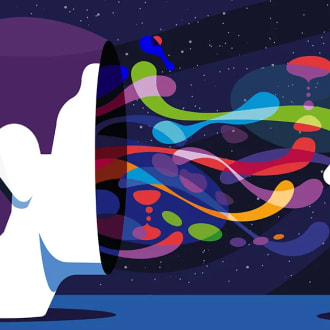
The Best Articles in Brain
The most useful articles and videos in Brain from around the web, curated by thought leaders and our community.
Refind focuses on timeless pieces and updates the list whenever new, must-read articles or videos are discovered.
Top 5 Brain Articles
At a glance: these are the articles that have been most read, shared, and saved in Brain by Refind users in 2024 so far.
Videos
Watch a video to get a quick overview.
The #1 way to strengthen your mind is to use your body
Exercise gives your brain a “bubble bath of neurochemicals,” says Wendy Suzuki, a professor of neural science. Subscribe to Big Think on YouTube ► https://ww...
Your brain doesn’t detect reality. It creates it.
This interview is an episode from @The-Well , our publication about ideas that inspire a life well-lived, created with the @JohnTempletonFoundation.Subscribe...
Can you trust your own brain? A neuroscientist explains
Nothing is real and everything is an illusion. Neuroscientist Heather Berlin explains why that’s not exactly a bad thing.Subscribe to Big Think on YouTube ► ...
Memory hack: Derren Brown teaches the method of loci
Memory hack: Method of lociWatch the newest video from Big Think: https://bigth.ink/NewVideoJoin Big Think Edge for exclusive videos: https://bigth.ink/Edge-...
Is consciousness an illusion? 5 experts explain
“If science aims to describe everything, how can it not describe the simple fact of our existence?” On this episode of Dispatches, Kmele speaks with the scie...
What is ...?
New to Brain? These articles make an excellent introduction.
What is neurodiversity?
People think, learn, behave, and experience the world around them in many different ways. Neurodiversity refers to those variations in neurocognitive functioning.
What Is the Dissociative Mind?
When we face overwhelming stress, disconnecting can be a coping skill.
«Dissociation happens because the person is engaged in an automatic activity and is not paying attention to his or her immediate environment.»
What is neurodiversity?
The term neurodiversity conveys the idea that there is no single right way of thinking, learning, or behaving, and is often used in the context of autism spectrum disorder. A growing self-ad...
How to ...?
How to maintain a healthy brain
Adopt these lifestyle changes and you will not only sharpen your mind today but also reduce your risk of dementia later on
«Train your body Just as mental health and brain health are deeply entwined, so too are your overall physical health and your brain health»
How to Think: The Skill You've Never Been Taught
No skill is more valuable than the ability to think. But how can we learn to think better? How can we avoid thinking poorly. Let's explore.
«Thinking means concentrating on one thing long enough to develop an idea about it. Not learning other people’s ideas, or memorizing a body of information, however much those may sometimes be useful.»
How To Learn Stuff Quickly
As software developers, we're always learning new things; it's practically the whole gig! If we can learn to quickly pick up new languages/frameworks/tools, we'll become so much more effective at our…
«I have a terrible memory. This can be a bit problematic; it's hard to learn stuff if you can't remember things! Fortunately, I have a system: spaced repetition.»
How to Stop Overthinking and Start Trusting Your Gut
Five strategies to strengthen your sixth sense.
«When you approach a decision intuitively, your brain works in tandem with your gut to quickly assess all your memories, past learnings, personal needs, and preferences and then makes the wisest decision given the context. In this way, intuition is a form of emotional and experiential data that leaders need to value.»
How To Learn Faster And Smarter (Your Complete Guide)
If you stop learning, you'll stop progressing in life. It's never too late to learn how to learn, and this ultimate guide will show you how to learn faster.
Trending
These links are currently making the rounds in Brain on Refind.
Lucky vs. Repeatable
Luck plays such a big role in the world. But few people want to talk about it. If I say you got lucky, I look jealous. If I tell myself that I got lucky, I feel diminished. Maybe a better way to frame…
«You can learn a lot from Warren Buffett’s patience. But you can’t replicate the market environment he had in the 1950s, so be careful copying the specific strategies he used back then.»
The radical idea that people aren't stupid
OR, the toilet spoke and I understood the truth
Two key brain systems are central to psychosis, study finds
Inside the brains of people with psychosis, two key systems are malfunctioning: a "filter" that directs attention toward important external events and internal thoughts, and a "predictor" composed of…
Salt-Sized Sensors Mimic the Brain
An array of tiny wireless nodes could someday find their way into brain-machine interfaces
Why loneliness is bad for your health
A lack of social interaction is linked to a higher risk of cardiovascular disease, dementia and more. Researchers are unpicking how the brain mediates these effects.
Short Articles
Short on time? Check out these useful short articles in Brain—all under 10 minutes.
What Is Brain Fog?
Brain fog, aka limited cognitive function, may be caused by stress, poor sleep, medications, and more. Here’s what you should know.
«Taking medication may include side effects related to brain fog. For example, topiramate (Topamax), which is used to treat migraine, can leave you feeling mentally murky»
How a second language can boost the brain
ven when you’re fluent in two languages, it can be a challenge to switch back and forth smoothly between them. It’s common to mangle a split verb in Spanish, use the wrong preposition in English, or…
How the brain responds to reward is linked to socioeconomic background
MIT neuroscientists have found that the brain’s sensitivity to rewarding experiences — a critical factor in motivation and attention — can be shaped by socioeconomic conditions.In a study of 12 to 14…
«The fMRI scans performed during the study also revealed that children from lower SES backgrounds showed less activation in the striatum when they guessed correctly, suggesting that their brains have a dampened response to reward»
What Your Brain Is Doing When You’re Not Doing Anything
When your mind is wandering, your brain’s “default mode” network is active. Its discovery 20 years ago inspired a raft of research into networks of brain regions and how they interact with each other.
Active vs. Passive Learning
If I asked, which do you think will lead to a healthier, happier relationship: An arranged marriage by someone who doesn’t know you. Spending years meeting hundreds of people with different…
Long Articles
These are some of the most-read long-form articles in Brain.
What Is the Nature of Consciousness?
Consciousness, our experience of being in the world, is one of the mind’s greatest mysteries, but as the neuroscientist Anil Seth explains to Steven Strogatz, research is making progress in…
Consciousness: New Concepts and Neural Networks
The definition of consciousness remains a difficult issue that requires urgent understanding and resolution. Currently, consciousness research is an intensely focused area of neuroscience. However, to…
How to Survive a Car Crash in 10 Easy Steps
A journalist navigates a world forever changed by her traumatic brain injury.
How Addictive Tech Hacks Your Brain
Are digital addictions really comparable to substance use disorders? Here's what the latest neuroscience suggests.
Why we can dream in more than one language
Sleep has a more powerful role in language-learning than was previously thought. What does this reveal about our night-time brain?
Thought Leaders
We monitor hundreds of thought leaders, influencers, and newsletters in Brain, including:
What is Refind?
Every day Refind picks the most relevant links from around the web for you. Picking only a handful of links means focusing on what’s relevant and useful.
How does Refind curate?
It’s a mix of human and algorithmic curation, following a number of steps:
- We monitor 10k+ sources and 1k+ thought leaders on hundreds of topics—publications, blogs, news sites, newsletters, Substack, Medium, Twitter, etc.
- In addition, our users save links from around the web using our Save buttons and our extensions.
- Our algorithm processes 100k+ new links every day and uses external signals to find the most relevant ones, focusing on timeless pieces.
- Our community of active users gets the most relevant links every day, tailored to their interests. They provide feedback via implicit and explicit signals: open, read, listen, share, mark as read, read later, «More/less like this», etc.
- Our algorithm uses these internal signals to refine the selection.
- In addition, we have expert curators who manually curate niche topics.
The result: lists of the best and most useful articles on hundreds of topics.
How does Refind detect «timeless» pieces?
We focus on pieces with long shelf-lives—not news. We determine «timelessness» via a number of metrics, for example, the consumption pattern of links over time.
How many sources does Refind monitor?
We monitor 10k+ content sources on hundreds of topics—publications, blogs, news sites, newsletters, Substack, Medium, Twitter, etc.
Who are the thought leaders in Brain?
We follow dozens of thought leaders in Brain, including hardmaru, Andrew Ng, nature, ADDitude, Ness Labs.
Missing a thought leader? Submit them here
Can I submit a link?
Indirectly, by using Refind and saving links from outside (e.g., via our extensions).
How can I report a problem?
When you’re logged-in, you can flag any link via the «More» (...) menu. You can also report problems via email to hello@refind.com
Who uses Refind?
450k+ smart people start their day with Refind. To learn something new. To get inspired. To move forward. Our apps have a 4.9/5 rating.
Is Refind free?
Yes, it’s free!
How can I sign up?
Head over to our homepage and sign up by email or with your Twitter or Google account.
Keep Learning
Learn something new, guided by experts. Deep Dives are carefully hand-curated series of time-tested articles and videos from around the web.
Get the big picture on your favorite topics.

